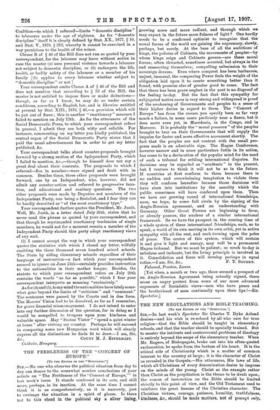THE FEEBLENESS OF THE " CONCERT OF EUROPE."
[To THE EDITOR Or THE " SPECTATOR." J
SIR,—No one who observes the political situation from day to day can demur to the somewhat sombre conclusions of your article on " The Feebleness of the ' Concert of Europe,'" in last week's issue. It stands confessed in its acts, and still more, perhaps, in its inaction. At the same time I cannot think it is as comprehensively, as it is narrowly, just to envisage the situation in a spirit of gloom. Is there not to this cloud in the political sky a silver lining,
growing more and more radiant, and through which we may expect in the future more fulness of light P One hardly needs to be a confirmed optimist to recognise that the moral forces of .the world are gaining the supremacy, slowly, perhaps, but surely. At the base of all the ambitions of kings, the policies of Cabinets, the movements of peoples—by whom kings reign and Cabinets govern—are these moral forces; often thwarted, sometimes arrested, but always in the end reasserting themselves; compelling submission to their sovereign decrees. Even where conquest has been barbarous, unjust, immoral, the conquering Power feels the weight of the obligation laid upon it to create something better than it found, with promise also of greater good to come. The fact that there has been grave neglect in the past is no disproof of the feeling to-day. But the fact that this sympathy for subjugated native races is very strong and widespread is proof of the awakening of Governments and peoples to a sense of their higher duties in regard to them. The " Concert of Europe" has from the causes you specify been so far very much a failure, in some cases perilously near a fiasco, but it does move even yet, in Macedonia, in the Congo, and in Morocco. It is probably the " moral pressure " of the peoples brought to bear on their Governments that will supply the impulse for faster and more effective movement shortly. The fact that the peoples are not content with the small pro- gress made is an admirable sign. The Hague Conference, however narrow and in some particulars futile in its action, has come to be a declaration of the popular mind for the need of such a tribunal for settling international disputes. Its decisions may be regarded as " academic " in the present, but I venture to think it will not be so in the future. If countries at first conform to them because there is no sudden and overwhelming temptation to violate them they will conform hereafter because those decisions will have risen into institutions by the sanctity which the public conscience will have conferred upon them. Then we have our growing round of international friendships, soon, we hope, to come full circle by the signing of the Anglo-Russian agreement, and an understanding with Germany. Other Great Powers are beginning to form, or already possess, the nucleus of a similar international framework. So we have the prospect in the coming time of a whole system of these international friendships, each, so to speak, a world of its own moving in its own orbit, yet in active sympathy with all the rest, and each turning upon the poles of peace. The centre of this system, which will sustain it and give it light and energy, may well be a permanent Hague tribunal. But we must be patient; so much to-day is nebulous and inchoate, but the living principle is involved in it. Consolidation and force will develop perhaps in equal [Yet when, a month or two ago, there seemed a prospect of an Anglo-Russian Agreement being actually signed, there arose an angry protest from some of our most advanced exponents of Socialistic views—men who have peace and the brotherhood of man continually upon their lips !—En. Spectator.]


































 Previous page
Previous page